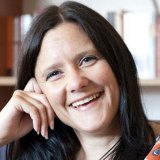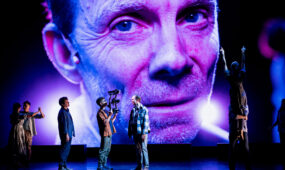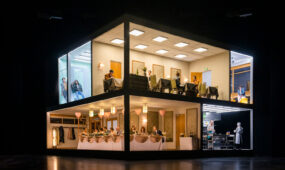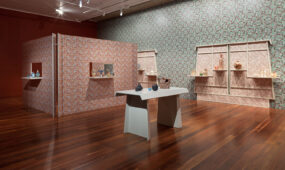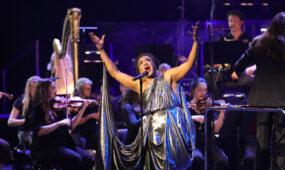The word on this year's Adelaide Writers’ Week
Adelaide Festival
More than 100 authors and thousands of readers will gather in the Pioneer Women’s Memorial Garden for the 2020 Adelaide Writers’ Week. Avid reader, bookseller and session chair Jo Case tells us the 10 authors she’s most excited to see.

I’ve been a fan of Adelaide Writers’ Week since I was 15 years old and spent a week away from school at a Writers’ Week creative writing workshop, workshopping my “novel-in-progress” with a real-life, published writer (the late Caroline McDonald).
Then, in my first year at university (1994), I was sent to the Writers’ Week lawns as a homework assignment, and was amazed to find myself sprawling in the sun, listening to Simone de Beauvoir’s biographer, Deirdre Bair, talk about Paris under a white canvas tent – just metres away from me.
The next year, I would get my first bookshop job, and two years later, my first publishing job, but Writers’ Week will always remain the first place where writers became real to me. Where I got a glimpse that books could live outside their pages, and that it might be possible to some day be part of that world.
Decades later, so much has changed in the world of books and publishing, but Adelaide Writers’ Week is still there. You can still wander down to the lawns of the Pioneer Women’s Memorial Garden, across the road from the River Torrens and the Festival Centre, and listen – for free! – as a selection of the best writers from around Australia and the world bring their books to life.
Here are my top 10 personal picks for authors to watch at the event this year (February 29 –March 5). It’s a highly subjective list – you can make your own by browsing the Writers’ Week program online, or picking up a hard-copy program from an Adelaide bookshop.
Joan Silber (US)
 Joan Silber is a writer’s writer – beloved of Lorrie Moore (one of my all-time favourites!), Lauren Groff and Sarah Waters, and frequently compared to Alice Munro. Improvement, her eighth work of fiction, won the US National Book Critics Circle Award for Fiction.
Joan Silber is a writer’s writer – beloved of Lorrie Moore (one of my all-time favourites!), Lauren Groff and Sarah Waters, and frequently compared to Alice Munro. Improvement, her eighth work of fiction, won the US National Book Critics Circle Award for Fiction.
The novel is told in interlinked stories that come together as a nuanced whole, exploring the unexpectedly life-changing ripple effects of individual personal decisions for a cast of characters that stretches across America, and the world.
Among others, we inhabit the lives of New York single mother Reyna, whose boyfriend Boyd, paroled after a three-month prison stint, is involved in a perilous petty criminal scheme; Reyna’s aunt Kiki, who still reflects on her long-ago marriage in Turkey and life on a rural farm there; and a trio of fractious German travellers smuggling artefacts from Turkey back to Europe.
Julia Phillips (US)
 In the first chapter of American author Julia Phillips’ novel Disappearing Earth, set on Russia’s remote Kamchatka peninsula, two middle-class schoolgirls distracting themselves on a small-town beach while their mother is at work are lured into a car and abducted.
In the first chapter of American author Julia Phillips’ novel Disappearing Earth, set on Russia’s remote Kamchatka peninsula, two middle-class schoolgirls distracting themselves on a small-town beach while their mother is at work are lured into a car and abducted.
As the months tick by, we enter the lives of a witness to the crime, a neighbour, a detective investigating the crime, the girls’ mother, and residents of a neighbouring remote community where another young girl, from a troubled family, went missing – to much less fanfare.
I was riveted by this novel and the echoes and connections between its characters, and the way they come together to create a portrait of a post-Soviet Russia far from the urban capitals.
Pitchaya Sudbanthad (Thailand/US)
 Bangkok Wakes to Rain is a fascinating, intricately imagined exploration of a city over centuries, centred around the intersecting lives connected to a colonial building in Bangkok and the apartment complex later built on its grounds. It stretches back to the 19th century and a homesick American missionary, and into the climate-change-affected future – where whole neighbourhoods of Bangkok are submerged under water, and new technology artificially prolongs lives.
Bangkok Wakes to Rain is a fascinating, intricately imagined exploration of a city over centuries, centred around the intersecting lives connected to a colonial building in Bangkok and the apartment complex later built on its grounds. It stretches back to the 19th century and a homesick American missionary, and into the climate-change-affected future – where whole neighbourhoods of Bangkok are submerged under water, and new technology artificially prolongs lives.
It also travels around the world, to London, middle America and Japan, following characters’ ebbing migrations and returns. It’s a story of not just intersecting lives, but a place where the ancient and the modern, poverty and luxury, sit alongside each other. Pitchaya Sudbanthad, like many of his characters, straddles worlds – he splits his time between Bangkok and Brooklyn.
Helen Garner (Aus)
 I am, as I have confessed before, a huge Helen Garner fan: I am in awe of her craft, and particularly of the way she blends reportage, analysis, reflection and masterful use of a fiction writer’s toolkit in her non-fiction books.
I am, as I have confessed before, a huge Helen Garner fan: I am in awe of her craft, and particularly of the way she blends reportage, analysis, reflection and masterful use of a fiction writer’s toolkit in her non-fiction books.
Over the years, I’ve listened to her talk several times, and I have always come away with a bristling brain and a notebook full of fragmentary quotes.
At Writers’ Week this year, she’ll be interviewed by Annabel Crabb about Yellow Notebook, the first volume of her diaries, and it’s a conversation I cannot wait to eavesdrop on.
Lucia Osborne-Crowley (Aus)
 Late last year, I followed a Facebook link being shared by several women writer friends to a Meanjin essay by a writer I’d never heard of before, Lucia Osborne-Crowley, in defence of dependence in relationships. It was gorgeously written, emotionally articulate and made me want to read more by this writer.
Late last year, I followed a Facebook link being shared by several women writer friends to a Meanjin essay by a writer I’d never heard of before, Lucia Osborne-Crowley, in defence of dependence in relationships. It was gorgeously written, emotionally articulate and made me want to read more by this writer.
In her byline was a link to a book, I Choose Elena, published by a small UK publisher. I chased it down. This month, Lucia’s book is published by Allen & Unwin, and at Writers’ Week, I am lucky enough to be interviewing her on stage, (with another brilliant young writer, Bri Lee).
Lucia, then a gymnast on track to an Olympic career, survived a horrific sexual assault, aged 15. She then repressed it for another decade, in which her body essentially stopped working, developing severe PTSD and two conditions that have been documented as linked to trauma: endometriosis and Crohn’s.
In I Choose Elena, Lucia writes exquisitely and bravely about her experiences, drawing on psychology and literature, and ultimately choosing to define herself by those experiences that nourish her, like the writing of Elena Ferrante, rather than the experiences that have irreparably harmed her. She is a remarkable new Australian writing talent.
Serhii Plokhy (Ukraine/US)
 Last year’s HBO series Chernobyl put the 1986 nuclear disaster at the top of our minds again, dramatising in detail the real-life story of the disaster and its devastating impact. Serhii Plokhy’s book, Chernobyl: A History of the Tragedy, takes the reader inside the disaster and its aftermath – and its political context, as a terrifying emblem of the decline of the Soviet system, and its focus on productivity over people.
Last year’s HBO series Chernobyl put the 1986 nuclear disaster at the top of our minds again, dramatising in detail the real-life story of the disaster and its devastating impact. Serhii Plokhy’s book, Chernobyl: A History of the Tragedy, takes the reader inside the disaster and its aftermath – and its political context, as a terrifying emblem of the decline of the Soviet system, and its focus on productivity over people.
It was, Plokhy argues, not an accident so much as a disaster waiting to happen. He’s a must-see for anyone who wants to know more about the human and political story behind Chernobyl.
Jess Hill (Aus)
 Jess Hill’s incredible work of investigative journalism on domestic violence in Australia, See What You Made Me Do, was one of the best books published last year, to my mind. (To back me up, it’s currently longlisted for the Stella Prize, and was shortlisted for the Victorian Premier’s Literary Prize and the Walkley Book Award.)
Jess Hill’s incredible work of investigative journalism on domestic violence in Australia, See What You Made Me Do, was one of the best books published last year, to my mind. (To back me up, it’s currently longlisted for the Stella Prize, and was shortlisted for the Victorian Premier’s Literary Prize and the Walkley Book Award.)
In gripping, convincing, deeply human prose, Hill tells the stories of domestic violence victims, perpetrators, and those who work in the field, attempting to understand and explain its social and psychological causes, and to open a national conversation that will lead to finding better ways of creating much-needed change.
Sanam Maher (Pakistan)
 Sanam Maher’s subject is an unlikely and intriguing one: Pakistan’s first social media star, a woman dubbed the Pakistani Kim Kardashian, who escaped an abusive marriage (leaving her son to do so) and thought she found in social media a kind of freedom.
Sanam Maher’s subject is an unlikely and intriguing one: Pakistan’s first social media star, a woman dubbed the Pakistani Kim Kardashian, who escaped an abusive marriage (leaving her son to do so) and thought she found in social media a kind of freedom.
From a conservative Muslim family, Qandeel Baloch was ultimately murdered by her brother in an “honour killing”.
A Woman Like Her, The Short Life of Qandeel Baloch promises to be an illuminating investigation into Pakistan’s class, gender and sexual mores. The New York Times calls it, “a book about what it means to be a woman in Pakistan and also online … a map of the savage underworld we’ve made”.
Wai Chim (China/US)
 Wai Chim’s YA novel The Surprising Power of a Good Dumpling (set in Sydney) is a beautiful, affecting novel that explores mental health, family, obligations and cultural differences, infused with a passion for food and deep love for its characters – and that made me literally cry when I read it last year.
Wai Chim’s YA novel The Surprising Power of a Good Dumpling (set in Sydney) is a beautiful, affecting novel that explores mental health, family, obligations and cultural differences, infused with a passion for food and deep love for its characters – and that made me literally cry when I read it last year.
Sixteen-year-old Anna takes a parental role with her siblings when her mother stays in bed for days, or behaves in manic bursts of activity, and while her father spends nights sleeping at the Chinese restaurant he runs. When she convinces her father to give her a holiday job working at the restaurant, which she joyfully immerses herself in, she unexpectedly starts a romance with an Anglo delivery boy with his own mental health issues. And things with her mother come to a dramatic, complex breaking point.
I was excited when I found out Chim will be appearing at Writers’ Week’s Middle & YA Day, where I plan to sit among the teenagers and listen to her speak.
Charlotte Wood (Aus)
 Charlotte Wood is best known for her Stella Prize-winning sensation The Natural Way of Things, set in a near-future misogynist Australian dystopia. But, while I agreed that it was an extraordinary and inventive work of channelled fury, my favourite Charlotte Wood mode is the one she employs in her latest novel, The Weekend: a finely honed social realism, with nuanced characters who feel real, and whose intricately observed details reflect larger stories about Australians and how we live and relate.
Charlotte Wood is best known for her Stella Prize-winning sensation The Natural Way of Things, set in a near-future misogynist Australian dystopia. But, while I agreed that it was an extraordinary and inventive work of channelled fury, my favourite Charlotte Wood mode is the one she employs in her latest novel, The Weekend: a finely honed social realism, with nuanced characters who feel real, and whose intricately observed details reflect larger stories about Australians and how we live and relate.

Get InReview in your inbox – free each Saturday. Local arts and culture – covered.
Thanks for signing up to the InReview newsletter.
The Weekend follows three female friends in their seventies – a single, financially precarious actress, a widowed academic still working and a retired restaurateur in a long-term affair with a married man – as they get together to sort through the belongings of the recently deceased fourth member of their decades-long quartet at her beach house. It’s a feminist The Big Chill.
Jo Case writes a regular Diary of a Bookseller column for InDaily, and works at Imprints on Hindley Street. She is a session chair at 2020 Adelaide Writers’ Week.
Adelaide Writers’ Week is in the Pioneer Women’s Memorial Garden (King William Road) from February 29 until March 5.
See more InDaily, CityMag and SALIFE Adelaide Festival stories here.
Support local arts journalism
Your support will help us continue the important work of InReview in publishing free professional journalism that celebrates, interrogates and amplifies arts and culture in South Australia.
Donate Here
